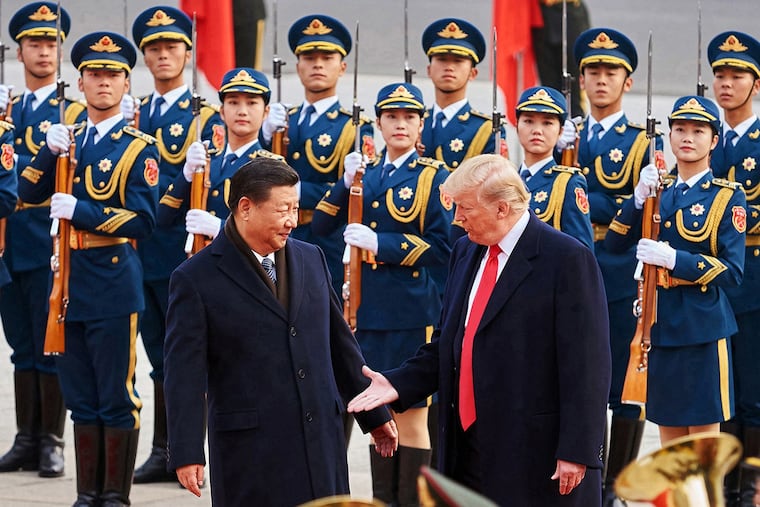‘The dog’s going to die one day,’ but U.S. economy still expected to grow in 2020
Executives from the retailer Five Below, the Philly Fed, and NFI logistics held forth on the future of the U.S. economy.

The U.S. economy’s growth will continue to chug along, albeit at a slower pace, in 2020, say Philadelphia economists and business owners.
FS Investments’ chief U.S. economist, Lara Rhame, likened America’s economy to “an airplane cruising along nicely, but at a lower altitude” than in 2019 and the last decade of economic expansion.
Rhame estimates that the U.S. economy will grow at 1.75% this year, vs. a 2.2% average annually in the last decade. That’s the lowest rate since World War II, but consumer sentiment remains positive and the unemployment rate is at a 50-year low.
U.S. consumers account for 70% of the growth in the U.S. economy, which totals $20 trillion annually.
“The consumer still dominates the U.S. economy,” Rhame told the Chamber of Commerce for Greater Philadelphia’s Friday economic outlook event, when executives from Five Below, NFI, and the Philadelphia Federal Reserve also spoke.
However, “we are late in the business cycle. Will the expansion turn 12 [years old]? The dog’s going to die one day,” Rhame said, drawing a laugh. .
The recent trade deal with China “was mostly cosmetic surgery” that didn’t address intellectual property theft, cyber attacks, or IT piracy issues.
The Fed has already cut rates aggressively and “is low on ammunition” to counteract any slowdown, she said. The Fed funds rate is 1.5% after three rate cuts.
Many business owners are holding off on big decisions until after the November election. Depending on the outcome, Rhame said, “we could have a policy shift in technology, in health care, trade, and regulation.”
Rhame was followed by a panel including Sidney Brown, CEO of NFI in Camden, and Joel Anderson, CEO of Five Below.
Five Below reported dismal earnings last week but still plans to open an additional 180 stores nationally in 2020, up from 150 in 2019.
“Impact from the tariffs is an understatement,” Anderson said. “We broke $5 [the previous maximum price for items] for the first time ever due to tariffs. Our costs surged. It’s not how I would have gone” in confronting China. However, “we’ve seen the high-water mark” for tariffs.
“Policy uncertainty” also hurts, Anderson said. “It’s difficult to plan and predict for the coming year."
Five Below has grown to $2 billion in sales annually, up from $500 million in 2015, he said. The company also recently acquired equity stakes in Nerd Street Gamers and Hollar.com to raise its gaming and e-commerce presence.
“Teens and tweens spend a lot more time gaming,” he said, so Five Below will install gaming centers in some stores.
NFI, a freight and logistics company, also experienced a slowdown in tonnage compared with last year, said CEO Brown.
“There was a definite deceleration, especially in the second half of 2019; our customers’ business was impacted by tariffs,” he said. Also, orders for new trucks and trailers dropped. “We may be in a slowdown in the economy that’s becoming more permanent.”
NFI is expanding its fleet into electric trucks, now being tested in the Los Angeles-Long Beach port area in California. “By 2025, about 50% of our fleet will be electric, as battery technology gets better.”
Greater Philly
Regionally, business conditions improved in 2019 compared with 2018, according to the Federal Reserve Bank of Philadelphia survey of chamber of commerce members.
Ryotaro Tashiro, a Philly Fed regional economist, found the “overall sentiment among businesses remains positive — more than 50% of respondents believe regional business activity was higher in 2019 than in 2018, and 53% expect higher general activity for their firms in 2020.”
New Jersey passes SALT workaround, but will IRS let it stand?
Governor Phil Murphy on Jan. 13 signed what business owners hope is a workaround of the $10,000 limit on state and local tax deductions.
The Pass-Through Business Alternative Income Tax Act allows businesses in New Jersey, such as sub-S corporations, partnerships, LLCs or sole proprietorships, to pay income taxes at the entity level instead of the business owner’s personal income tax level — helping to alleviate the Tax Cuts and Jobs Act’s state and local tax deduction cap.
New Jersey joins Connecticut, Louisiana, Oklahoma, Rhode Island, and Wisconsin in enacting a tax on pass-through entities, according to accountant Gary Bingel with EisnerAmper.
“High-tax states like California already tried some creative techniques that were effectively squashed at the federal level,” said Martin Abo, accountant with Abo Cipolla Financial Forensics in Mount Laurel. It remains to be seen if the IRS will allow the law to stand.
New Jersey pass-through entities can now pay personal state income taxes through the entity as if it were a business expense. Before this law, paying the tax individually subjected business owners to the limitation for federal limit of state and local taxes at $10,000, Abo said.
The law is effective for businesses for tax years beginning on or after Jan. 1.